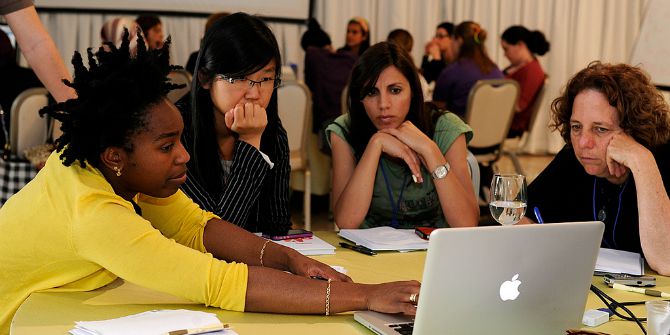
Since the 2008 financial crisis, entrepreneurship has become the preferred public solution to combat unemployment. Public discourses in many EU countries, including the UK, portray entrepreneurship as socially desirable and feasible. However, this ‘solution’ makes the unemployed responsible for creating their own jobs by asking them to stoically transition between unemployment and self-employment with little or no institutional support.
Thus, the unemployed are expected to epically endeavour to follow mythical entrepreneurial success stories. Such endeavour is almost impossible for them to fulfil, as many of those forced by the system to make up their own jobs are in a situation of long-term unemployment, unable to deal with the risks attached to starting their own business, and in conditions of personal crisis within a global context of economic uncertainty.
Indeed, our recent research in the UK, Ireland and Spain focusing on ‘necessity entrepreneurs’ —i.e., those who start a business because they lack any other means of generating income— has found very little institutional interest in understanding how necessity entrepreneurs can better manage their new ventures. ‘Necessity entrepreneurs’ seem invisible to both policy makers and academic researchers, as they are seen as less likely to succeed than ‘opportunity entrepreneurs’ —i.e., those who start a business because they spot an opportunity in the market that they want to pursue.
‘Necessity entrepreneurs’ don’t have previous entrepreneurial experience, generally having lower education levels, or a different motivation from ‘opportunity entrepreneurs’. As such, they are catalogued as having less impact in terms of employment creation and economic growth. Furthermore, the dominant public narrative on entrepreneurship is usually centred on a successful (male) individual entrepreneur that, with ‘hunger and personal initiative’, achieves success. This narrative denies a voice to nascent necessity entrepreneurs who end up either institutionally invisible or socially positioned as ‘outcasts’.
However, as our research shows, socially, economically and psychologically, ‘necessity entrepreneurs’ are making a difference on the ground, despite all the challenges they face. Their description of the process of entrepreneurship as unstable, extremely creative and painfully unfinished is diametrically different from mainstream entrepreneurial narratives. When starting a business, necessity entrepreneurs in the UK, Ireland and Spain report facing a bumpy ride full of ups and downs, making non-linear progress and having to become extremely innovative just to keep going.
Their transition from unemployment to entrepreneurship follows a common pattern. At first, their struggle is centred on gaining distance from a previous social position with a clear work identity. As unemployed, most of them suffer a period of stagnation, stigmatised as a personal and social failure. Losing a job goes beyond losing an income; they also lose identity, structure in their daily lives, and a defined place in their social structure. With the pressing need to generate an income, this period of separation usually finishes with a rite of passage; the unemployed is finally forced to explore other income venues, facing the reconstruction of their work identity, while inserting themselves back into the community at the same time.
What follows is an in-between liminal period between unemployment and self-employment. This is a period of transformation, where necessity entrepreneurs find their social and community structure dissolving and where they are pushed to find ‘structure’ by themselves, since the institutions they used to rely on (e.g., government or employers) find it difficult to provide one. As neither employed nor unemployed, nor yet fully ‘accomplished entrepreneurs’, emergent necessity entrepreneurs face social invisibility and the lack of a given social position.
More than other entrepreneurs, necessity entrepreneurs find themselves working at the limit of what they know, trying to create new realities and transform ideas into productive initiatives. For our invisible liminal subjects, this situation is at the same time distressing and empowering. Liminality is an unsettling state defined by its potential to question everything, but, as a result, enables innovation and creativity. In many cases, liminal moments become spaces that allow change, transgression and readjustment.
Entrepreneurship itself is ultimately a liminal and transformative condition, a process of creating possible futures and states of being. In the process of setting up their own ventures, many necessity entrepreneurs engage with and overcome institutional invisibility, lack of representation in dominant cultural narratives, and the self-doubts emerging from their own personal crises. Against this ‘necessity’ background, many manage to develop creative practices using whatever institutional ‘pores’ they find and challenging entrepreneurial self-narratives that write them out as entrepreneurs because of gender, age, or lack of success to advance their projects. While the future remains uncertain, they succeed in coping with daily changes, focus on short-term goals, feed their families and try to enjoy the process.
Many of their ventures manage to put food on the table, and, while not all believe in ‘final economic success’, many envision their business as part of their own personal life project, or as a potential contribution to their community. For example, the architect that decides to work on housing reforms in rural settings, or the ex-real estate agent that makes jam with zero carbon-footprint products, or the artists that become web designers for the small neighbourhood store, or the housewife who cooks for acquaintances and charges half of the cooked meal so she can feed her family with it.
Of course, not all necessity entrepreneurs manage to reaggregate socially, overcoming the situation of liminality. Some fail to complete a journey that requires a complete psychological and social transformation to enable new realities to emerge; for them, the feeling of permanently staying at the margins of society becomes chronic. However, many of them manage —with many doubts and few certainties— to become successful enough to just keep on going. This liminal group, mostly forgotten in the design of public policies due to their apparent inability to generate economic growth, plays a central role in fostering social change. They are the proof of an alternative and enabling entrepreneurial story.
We need to reclaim entrepreneurship for society, moving away from a stifling, purely economic discourse. To do so, we have to consider the real societal contexts in which entrepreneurial activities are happening and resist the trend to focus on already successful areas famous for innovation. Necessity entrepreneurs’ experiences show how, in a context where risk and uncertainty are the norm, engaging with the context creatively can generate both a social and an economic impact. Entrepreneurship becomes, then, ‘of society, not just of economy’.
For more information see Storying our World and What is the future of work?
♣♣♣
Notes:
- This blog post draws insights from the author’s paper Liminal Entrepreneuring: The Creative Practices of Nascent Necessity Entrepreneurs, co-authored with Paul Donnelly, Lucia Sell-Trujillo and J. Miguel Imas, Organization Studies (2017).
- The post gives the views of its author, not the position of LSE Business Review or the London School of Economics.
- Featured image credit: Untitled, by Lena Vasiljeva, under a CC-BY-NC-2.0 licence
- When you leave a comment, you’re agreeing to our Comment Policy
 Lucia Garcia-Lorenzo has a BA and an MSc in Psychology from Universidad del Pais Vasco, Spain; a PhD in Social Psychology from LSE and a PgCert from the Institute of Group Analysis (IGA). She is Director of the LSE’s MSc in Organisational and Social Psychology and coordinator of the Organisational Research Group (ORG). She specialises in cultural change in organisations after a major transition. She has taken part in a number of research and consultancy projects focused on change in organisations in different contexts. She is currently looking at the particularly difficult transitions between work, unemployment and entrepreneurship in different EU countries.
Lucia Garcia-Lorenzo has a BA and an MSc in Psychology from Universidad del Pais Vasco, Spain; a PhD in Social Psychology from LSE and a PgCert from the Institute of Group Analysis (IGA). She is Director of the LSE’s MSc in Organisational and Social Psychology and coordinator of the Organisational Research Group (ORG). She specialises in cultural change in organisations after a major transition. She has taken part in a number of research and consultancy projects focused on change in organisations in different contexts. She is currently looking at the particularly difficult transitions between work, unemployment and entrepreneurship in different EU countries.





